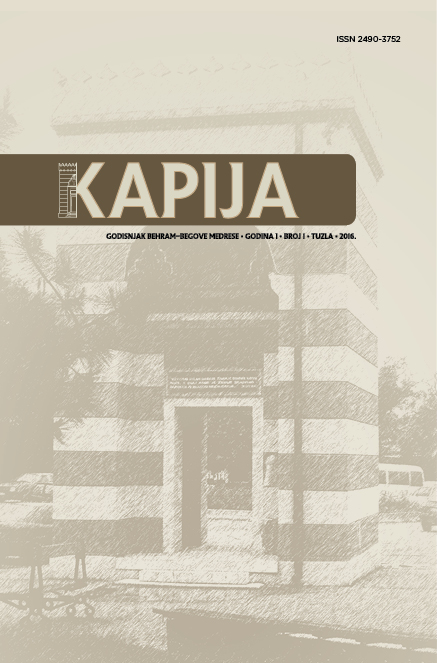Jakup Kadri Karaosmanoğlu
JAKUP KADRI KARAOSMANOĞLU, WRITER, JOURNALIST AND POLITICIAN
Addition to the madrasa’s required reading
Author(s): Admir MuratovićSubject(s): Turkish Literature, Theory of Literature
Published by: Behram-begova medresa
Keywords: literature; prose; poetry; short story; drama; rhymed prose; journalism; memoirs; monographs; novel
Summary/Abstract: Literary description Jakup Kadri Karaosmanoğlu is extensive and very diverse. He tried his hand in almost all kinds of prose. He achieved his full affirmation as a writer by writing novels. All he had previously written, as he said, was a kind of preparation to start writing novels. In addition to being a good writer, he was no less a good publicist and politician. His political ideas were such that they also had an effect on Mustafa Kemal Ataturk. Establishing the Republic of Turkey by carrying out comprehensive and radical reforms, the foundations of the modern Turkish nation were set as well as the frames for the flourish of the contemporary Turkish literature. Jakup Kadri Karaosmanoğlu is one of the most important literary figures of that period. Thanks to his good knowledge of the French language, he was excellently familiar with European literature, especially the French. That is how Balzac, Flobert, Maupassant and some other writers from the realists had the considerable influence on him. Some of his best-known and most important works include: Kiralık Konak (House under the lease, 1922), Nur Baba (1922), Hüküm Gecesi (Judgment Night, 1927), Sodom ve Gomore (Sodom and Gomorrah, 1928), Ankara (1934), Bir Sürgün (Exile, 1937), two-volume novel Panorama (1953-1954), Epic about Šark (Always that song, 1956). He was born in Cairo in 1889 and died in Ankara in 1974. He was buried in Istanbul›s Besiktas neighborhood, the cemetery Yahya-efendi, next to his mother.
Journal: Kapija, godišnjak Behram-begove medrese, Časopis za religijska i društvena istraživanja
- Issue Year: 1/2013
- Issue No: 1
- Page Range: 193-217
- Page Count: 25
- Language: Bosnian

